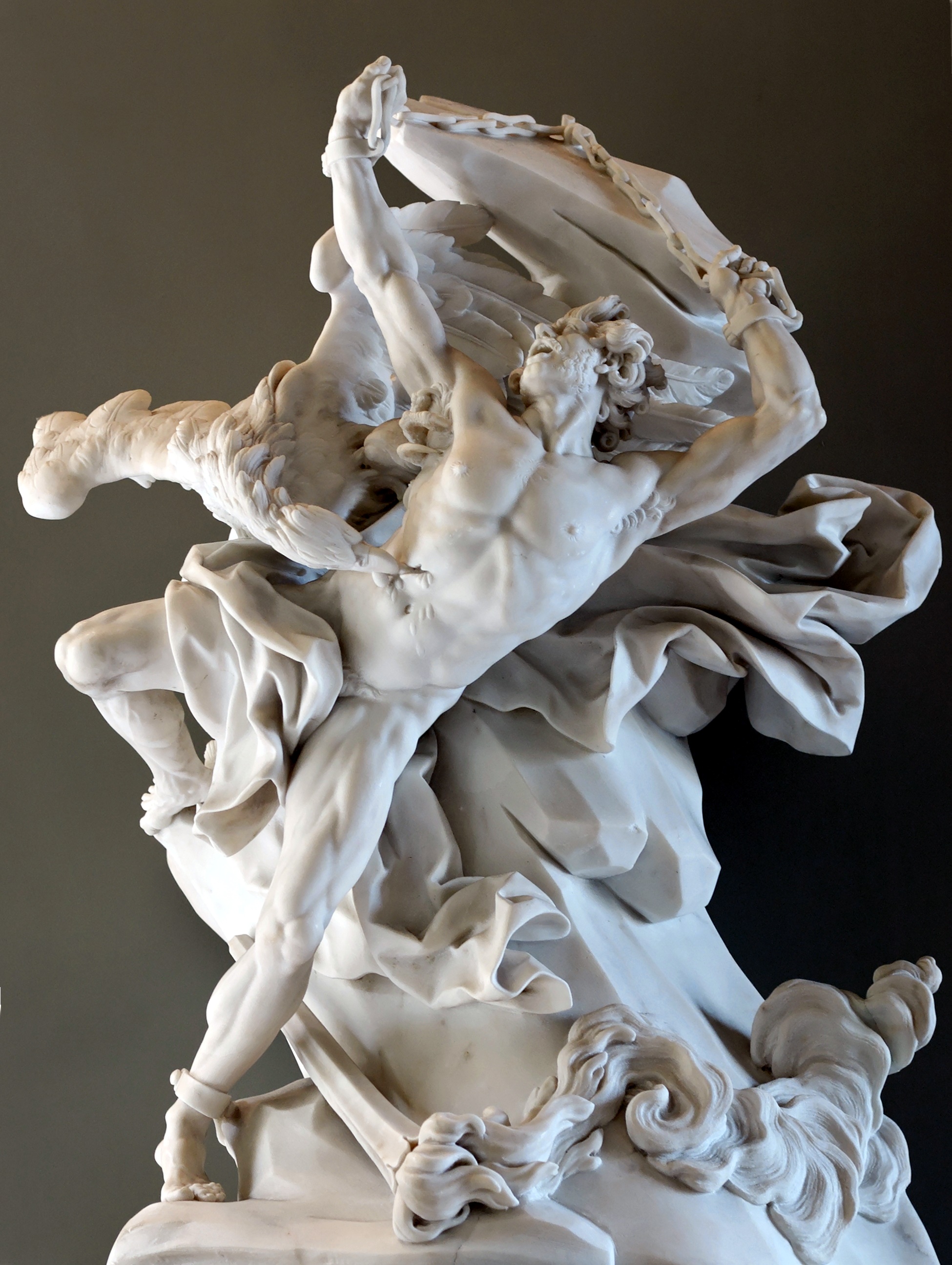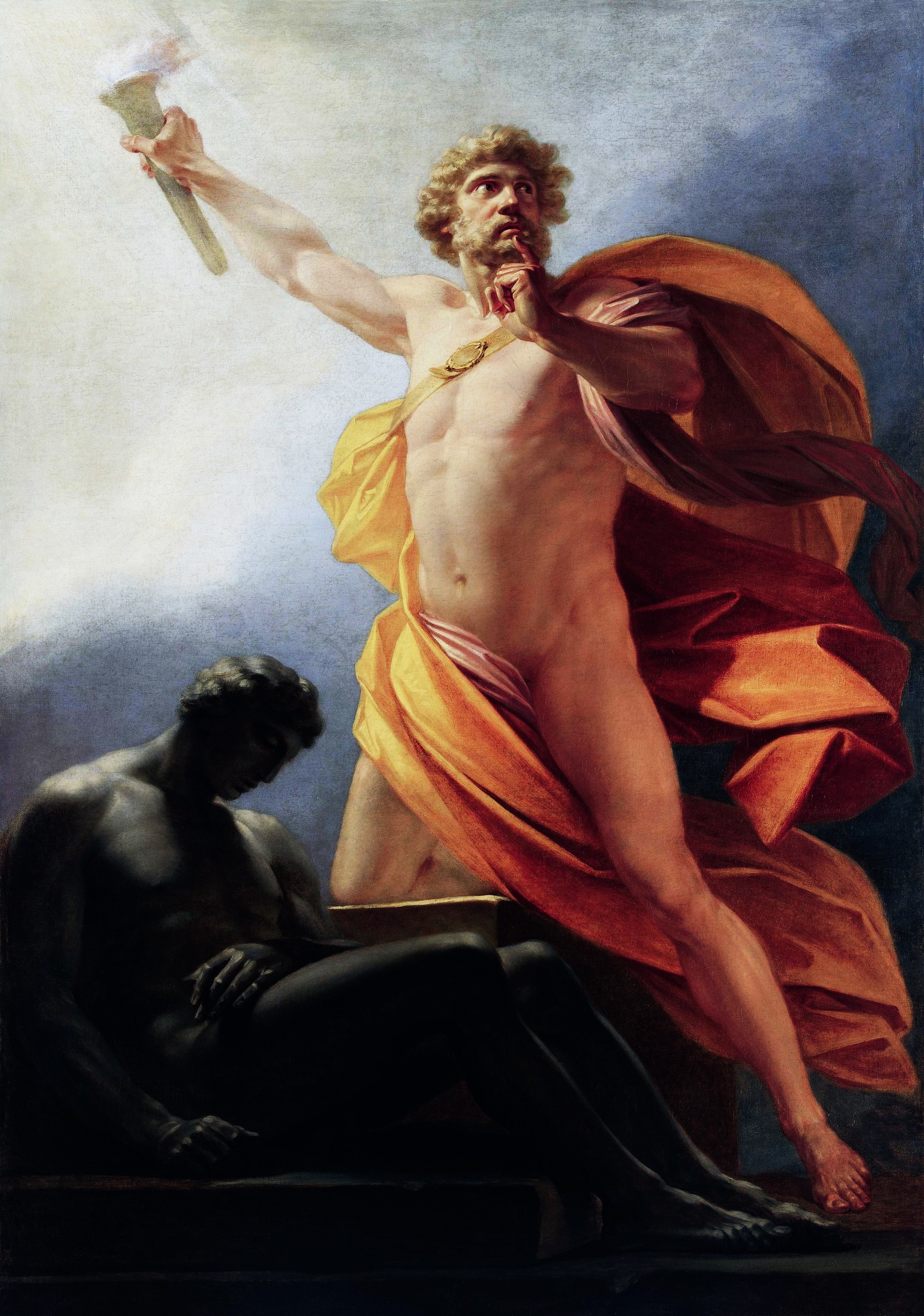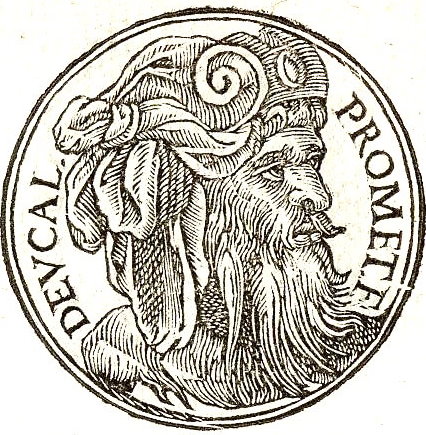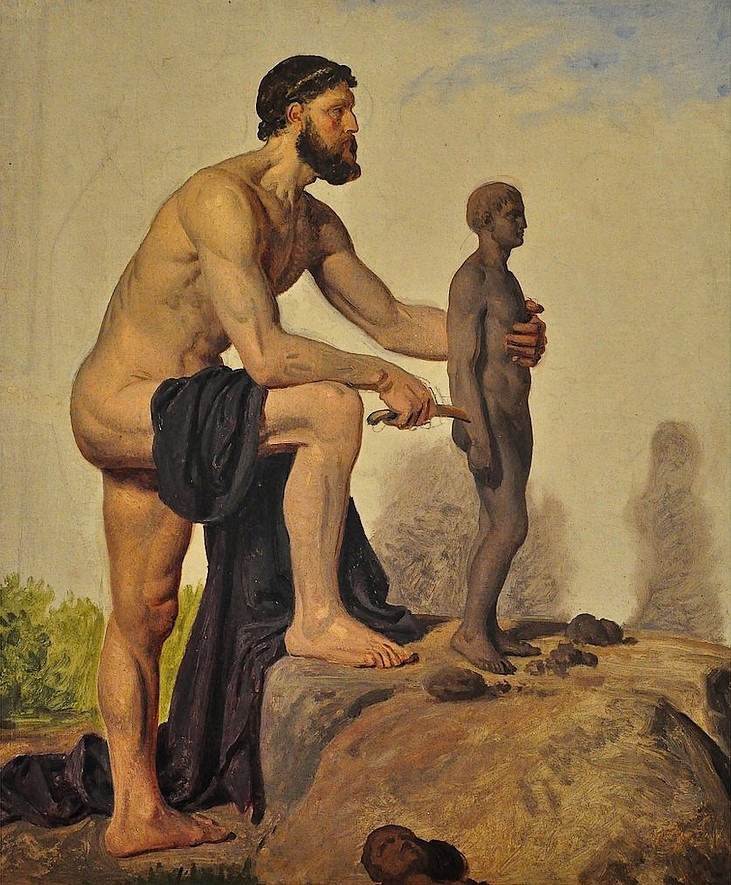|
Prometheus
In Greek mythology, Prometheus (; , , possibly meaning "forethought")Smith"Prometheus". is a Titans, Titan. He is best known for defying the Olympian gods by taking theft of fire, fire from them and giving it to humanity in the form of technology, knowledge and, more generally, civilization. In some versions of the myth, Prometheus is also credited with the Creation of life from clay, creation of humanity from clay. He is known for his intelligence and for being a champion of mankind and is also generally seen as the author of the human arts and sciences. He is sometimes presented as the father of Deucalion, the hero of the flood story. The punishment of Prometheus for stealing fire from Olympus and giving it to humans is a subject of both ancient and Prometheus in popular culture, modern culture. Zeus, king of the Olympian gods, condemned Prometheus to eternal torment for his transgression. Prometheus was bound to a rock, and an eagle—the emblem of Zeus—was sent to eat hi ... [...More Info...] [...Related Items...] OR: [Wikipedia] [Google] [Baidu] |
Prometheus In Popular Culture
The figure and name of Prometheus from classical mythology has appeared in various art and literature. Cartoons and comics * Soviet director Aleksandra Snezhko-Blotskaya created two cartoons in which Prometheus appears - ''The Return from Olympus'' (Возвращение с Олимпа, 1969) and ''Prometheus'' (Прометей, 1974), as part of her 5-film series about the Ancient Greek myths. * Prometheus appears in an episode of ''Hercules (1998 TV series), Hercules: The Animated Series'', where protagonist Hercules takes it upon himself to release Prometheus from his punishment, subsequently defending his decision to his father Zeus by arguing that humanity has proven themselves worthy of Prometheus' gift. * An animated short aired on Nickelodeon ''KaBlam!#Prometheus_and_Bob, Prometheus and Bob'' used the name to describe one of the main characters, an Ancient astronauts, alien attempting to teach a primitive human different things about modern society and civilization. F ... [...More Info...] [...Related Items...] OR: [Wikipedia] [Google] [Baidu] |
Titans
In Greek mythology, the Titans ( ; ) were the pre-Twelve Olympians, Olympian gods. According to the ''Theogony'' of Hesiod, they were the twelve children of the primordial parents Uranus (mythology), Uranus (Sky) and Gaia (Earth). The six male Titans were Oceanus, Coeus, Crius, Hyperion (Titan), Hyperion, Iapetus, and Cronus; the six female Titans—called the Titanides () or Titanesses—were Theia, Rhea (mythology), Rhea, Themis, Mnemosyne, Phoebe (Titaness), Phoebe, and Tethys (mythology), Tethys. After Cronus mated with his older sister Rhea, she bore the first generation of Olympians: the six siblings Zeus, Hades, Poseidon, Hestia, Demeter, and Hera. Certain other descendants of the Titans, such as Prometheus, Atlas (mythology), Atlas, Helios, and Leto, are sometimes also called Titans. The Titans were the former gods: the generation of gods preceding the Twelve Olympians#Olympians, Olympians. They were overthrown as part of the Greek succession myth, which tells how Cron ... [...More Info...] [...Related Items...] OR: [Wikipedia] [Google] [Baidu] |
Theft Of Fire
The theft of fire for the benefit of humanity is a theme that recurs in many world mythologies, symbolizing the acquisition of knowledge, or technology, and its transformative impact on civilization. Its recurrent themes include trickster figures as the thief, and supernatural heroic guardians who hoard fire from humanity, often out of mistrust for humans. These myths reflect the profound significance of fire in human history, seen as a pivotal step in the development of human society. In African mythology, the San peoples tell of ǀKaggen, stealing fire from the ostrich and bringing it to people. In the Americas, Native American and First Nations tribes attribute the gift of fire to animals. In Eurasian cultures, fire theft takes on various forms. The Vedic Rigveda narrates hero Mātariśvan recovering hidden fire. Greek mythology recounts Prometheus stealing heavenly fire for humanity, a deed for which he suffered greatly. In Oceania, Polynesian myths often feature Māui as th ... [...More Info...] [...Related Items...] OR: [Wikipedia] [Google] [Baidu] |
Iapetus
In Greek mythology, Iapetus (; ; ), also Japetus, is a Titan, the son of Uranus and Gaia and father of Atlas, Prometheus, Epimetheus, and Menoetius. He was also called the father of Buphagus and Anchiale in other sources. Iapetus was linked to Japheth (), one of the sons of Noah and a progenitor of mankind in biblical accounts. The practice by early historians and biblical scholars of identifying various historical nations and ethnic groups as descendants of Japheth, together with the similarity of their names, led to a fusion of their identities, from the early modern period to the present. Mythology Iapetus is the one Titan mentioned by Homer in the ''Iliad'' as being in Tartarus with Cronus. He is a brother of Cronus, who ruled the world during the Golden Age but is now locked up in Tartarus along with Iapetus, where neither breeze nor light of the sun reaches them. Iapetus' wife is usually described as a daughter of Oceanus and Tethys named either Clymene (according t ... [...More Info...] [...Related Items...] OR: [Wikipedia] [Google] [Baidu] |
Theogony
The ''Theogony'' () is a poem by Hesiod (8th–7th century BC) describing the origins and genealogy, genealogies of the Greek gods, composed . It is written in the Homeric Greek, epic dialect of Ancient Greek and contains 1,022 lines. It is one of the most important sources for the understanding of early Greek cosmology. Descriptions Hesiod's ''Theogony'' is a large-scale synthesis of a vast variety of local Greece, Greek traditions concerning the gods, organized as a narrative that tells how they came to be and how they established permanent control over the cosmos. It is the first known Greece, Greek mythical cosmogony. The initial state of the universe is Chaos (mythology), chaos, a dark indefinite void considered a divine primordial condition from which everything else appeared. Theogonies are a part of Greek mythology which embodies the desire to articulate reality as a whole; this universalizing impulse was fundamental for the first later projects of speculative theorizing ... [...More Info...] [...Related Items...] OR: [Wikipedia] [Google] [Baidu] |
Greek Mythology
Greek mythology is the body of myths originally told by the Ancient Greece, ancient Greeks, and a genre of ancient Greek folklore, today absorbed alongside Roman mythology into the broader designation of classical mythology. These stories concern the ancient Greek religion's view of the Cosmogony, origin and Cosmology#Metaphysical cosmology, nature of the world; the lives and activities of List of Greek deities, deities, Greek hero cult, heroes, and List of Greek mythological creatures, mythological creatures; and the origins and significance of the ancient Greeks' cult (religious practice), cult and ritual practices. Modern scholars study the myths to shed light on the religious and political institutions of ancient Greece, and to better understand the nature of mythmaking itself. The Greek myths were initially propagated in an oral tradition, oral-poetic tradition most likely by Minoan civilization, Minoan and Mycenaean Greece, Mycenaean singers starting in the 18th century&n ... [...More Info...] [...Related Items...] OR: [Wikipedia] [Google] [Baidu] |
Asia (Oceanid)
In Greek mythology, Asia (Ancient Greek: Ἀσία) was one of the 3,000 Oceanids, daughters of the Titans Oceanus and his sister-spouse Tethys. In some accounts, her mother was called Pompholyge and sister of Libye. Family According to Apollodorus, Asia was the wife of the Titan Iapetus, and mother of Atlas, Prometheus, Epimetheus and Menoetius although Hesiod gave the name of another Oceanid, Clymene, as their mother. It is possible that the name ''Asia'' became preferred over Hesiod's ''Clymene'' to avoid confusion with the Clymene who was mother of Phaethon by Helios in some accounts and must have been perceived as a distinct figure. Herodotus recorded the tradition that the continent ''Asia'' was named after Asia whom he called ''wife'' of Prometheus rather than ''mother'' of Prometheus, perhaps here a simple error rather than genuine variant tradition. Herodotus4.45.3/ref> Both Acusilaus and Aeschylus in his ''Prometheus Bound'' called Prometheus' wife Hesione. He ... [...More Info...] [...Related Items...] OR: [Wikipedia] [Google] [Baidu] |
Epimetheus
In Greek mythology, Epimetheus (; ) is the brother of Prometheus, the pair serving "as representatives of mankind". Both sons of the Titan Iapetus, while Prometheus ("foresight") is ingeniously clever, Epimetheus ("hindsight") is inept and foolish. In some accounts of the myth, Epimetheus unleashes the unforeseen troubles in Pandora's box. Mythology According to Plato's use of the old myth in his '' Protagoras'' (320d–322a), the two Titan brothers were entrusted with distributing the traits among the newly created animals. Epimetheus was responsible for giving a positive trait to every animal, but when it was time to give man a positive trait, lacking ''foresight'' he found that there was nothing left. Prometheus decided that humankind's attributes would be the civilising arts and fire, which he stole from Athena and Hephaestus. Prometheus later stood trial for his crime. In the context of Plato's dialogue, "Epimetheus, the being in whom thought follows production, represents ... [...More Info...] [...Related Items...] OR: [Wikipedia] [Google] [Baidu] |
Deucalion
In Greek mythology, Deucalion (; ) was the son of Prometheus; ancient sources name his mother as Clymene (mythology), Clymene, Hesione (Oceanid), Hesione, or Pronoia (mythology), Pronoia.A Scholia, scholium to ''Odyssey'' 10.2 (=''Catalogue of Women, Catalogue'' fr. 4) reports that Hesiod called Deucalion's mother "Pryneie" or "Prynoe", corrupt forms which Karl Wilhelm Dindorf, Dindorf believed to conceal Pronoea's name. The emendation is considered to have "undeniable merit" by A. Casanova (1979) ''La famiglia di Pandora: analisi filologica dei miti di Pandora e Prometeo nella tradizione esiodea''. Florence, p. 145. He is closely connected with a flood myth in Greek mythology. Etymology According to folk etymology, Deucalion's name comes from , ''deukos'', a variant of , ''gleucos'', i.e. "sweet new wine, must, sweetness" and from , ''haliéus'', i.e. "sailor, seaman, fisher". His wife Pyrrha's name derives from the adjective , -ά, -όν, ''pyrrhós, -á, -ón'', i.e. "flame- ... [...More Info...] [...Related Items...] OR: [Wikipedia] [Google] [Baidu] |
Zeus
Zeus (, ) is the chief deity of the List of Greek deities, Greek pantheon. He is a sky father, sky and thunder god in ancient Greek religion and Greek mythology, mythology, who rules as king of the gods on Mount Olympus. Zeus is the child of Cronus and Rhea (mythology), Rhea, the youngest of his siblings to be born, though sometimes reckoned the eldest as the others required disgorging from Cronus's stomach. In most traditions, he is married to Hera, by whom he is usually said to have fathered Ares, Eileithyia, Hebe (mythology), Hebe, and Hephaestus.Hard 2004p. 79 At the oracle of Dodona, his consort was said to be Dione (Titaness/Oceanid), Dione, by whom the ''Iliad'' states that he fathered Aphrodite. According to the ''Theogony'', Zeus's first wife was Metis (mythology), Metis, by whom he had Athena.Hesiod, ''Theogony'886900 Zeus was also infamous for his erotic escapades. These resulted in many divine and heroic offspring, including Apollo, Artemis, Hermes, Persephone, D ... [...More Info...] [...Related Items...] OR: [Wikipedia] [Google] [Baidu] |
Creation Of Life From Clay
The creation of life from clay (or soil, earth, dust, or mud) appears throughout world religions and mythologies, some of the earliest occurring in the creation myths about the origin of man in the Ancient Near Eastern cosmology, cosmology of the ancient Near East. The idea occurs in both biblical cosmology and Quranic cosmology. The clay represents an unformed, chaotic material which is shaped and given form by the gods in a creative process. A related motif is the use of clay to seed or create the world. In southwest Asia, the clay-shaping was cast as a magical act. In the same way that humans would use clay to make terracotta images of their gods, so the gods moulded humans out of clay in their godlike form. They were described as obtaining this material by pinching off pieces of wet mud. The most famous example of this is in the biblical Book of Genesis (2:7), where Adam is made out of dust, an idea that appears across the Bible (Book of Job, Job 10:9; Psalms, Psalm 90:3; 1 ... [...More Info...] [...Related Items...] OR: [Wikipedia] [Google] [Baidu] |
Clymene (wife Of Iapetus)
In Greek mythology, Clymene or Klymene (; , ''Kluménē'', feminine form of Κλύμενος, meaning "famous") is the name of one of the three thousand Oceanid nymphs, usually the wife of Iapetus and mother by him of Prometheus, Epimetheus, Atlas and Menoetius. Mythology Clymene is the daughter of the Titans Oceanus and Tethys. She married her uncle Iapetus and became by him the mother of Prometheus, Epimetheus, Atlas and Menoetius. Other authors relate the same of her sister Asia. A less common genealogy makes Clymene the wife of Prometheus and the mother of Deucalion by him. She may also be the Clymene referred to as the mother of Mnemosyne by Zeus. In some myths, Clymene was one of the nymphs in the train of Cyrene. Although she shares name and parentage with Clymene, one of Helios's lovers, who is also a daughter of Oceanus and Tethys (and thus one of her sisters and fellow Oceanid), she is distinguished from her.Hard Robin, pg44/ref> Genealogy ... [...More Info...] [...Related Items...] OR: [Wikipedia] [Google] [Baidu] |








